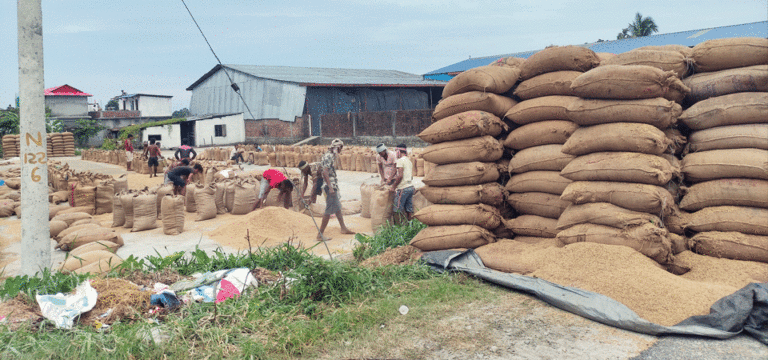
Farmers in Jhapa are worried about the lack of marketing and fair price of paddy.
Although the federal, province and local governments have introduced various programmes to attract the farmers to cultivate Chaite and Boro paddy, they are worried about the lack of marketing and fair price of the produced paddy.
Currently, the problem has started due to difficulty in selling Chaite paddy.
Due to the lack of dryer technology, farmers are compelled to sell paddy at the price fixed by the middlemen. The price of paddy, which was Rs. 800 per 40 kgs two weeks ago, is now less than Rs. 600.
Farmers have said that they got only low price even though the paddy was sold.
They said that the price of husk which is used for the cattle as feed is Rs. 500 to Rs. 550 per 40 kgs, but the price of paddy is not even Rs. 600 now.
The Paddy Super Zone Programme under the Prime Minister’s Agriculture Modernisation Project has been providing everything from necessary technology to technical assistance to increase paddy production.
The local levels in the district are also providing new varieties and improved paddy seedlings to the farmers. They have also assisted in the necessary mechanization from irrigation. Due to this paddy has been cultivated in the district up to three times a year.
According to local farmer Pushparaj Pathak, farmers did not get the price of paddy even at par with husk. Farmer Radhika Bhandari of Kamal Rural Municipality said that the price of paddy is Rs. 500 per 40 kgs.
Bhandari said that they have about 2,000 kgs of paddy which has not been sold. Chief of the Prime Minister’s Agriculture Modernisation Project Implementation Unit Rabindra Subedi said that there was a problem in marketing.
On the other hand, there is a lack of dryer machine used for drying paddy, he said. If there was a dryer in the village, the farmers would be able to store the dried paddy themselves and sell it when the price goes up, he said.
Subedi also said that the problem of farmers would be solved to some extent by constructing community type storage houses by managing portable dryers.
If the local municipalities make arrangements for marketing and storage to solve the problems of the farmers, the current problem will be reduced to some extent, he said.
Source : THE RISING NEPAL,






